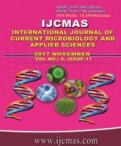


 National Academy of Agricultural Sciences (NAAS)
National Academy of Agricultural Sciences (NAAS)

|
PRINT ISSN : 2319-7692
Online ISSN : 2319-7706 Issues : 12 per year Publisher : Excellent Publishers Email : editorijcmas@gmail.com / submit@ijcmas.com Editor-in-chief: Dr.M.Prakash Index Copernicus ICV 2018: 95.39 NAAS RATING 2020: 5.38 |
Dairy farming plays a prominent role in strengthening India’s rural economy. It has the potential to act as an instrument to bring about socio-economic transformation, but in recent days climate variability affects the dairy farming and it became the serious consideration. Climate variability refers to the way climate fluctuates yearly above or below a long-term average value. It has been considered as one of the most serious long-term challenge faced by dairy farmers, in this context it is important to know about the adaptation strategies followed by the dairy farmers in combating the climate variability vagaries. The present study was conducted in purposively selected Northern dry zone of Karnataka with 120 dairy farmers, the major findings of the study were, Majority of the respondents were following adaptation strategies like keeping, promoting and interested in local breeds (60.83%), About 42.50 percent of dairy farmers made Changes in micro-climate in cattle shed/stall and 47.50 percent of respondents were providing extra concentrate, minerals supplementation and feed additives to their livestock etc. It was also found that all the adaptation techniques are local specific, require no external help and are inherently scientific. Dairy farmers used to follow the cost effective adaption strategies. Documentation and validation of such practices and techniques should be done and it can be used for further capacity building programmes.
 |
 |
 |
 |
 |